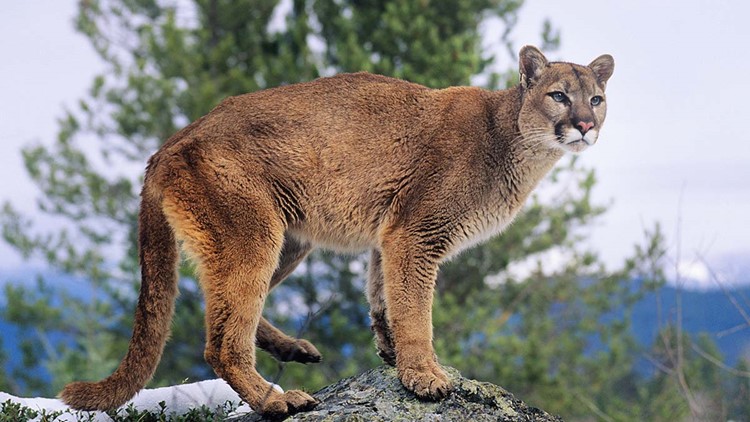TEXAS, USA — Mountain lions still roam parts of Texas as one of the state’s last remaining native carnivores. On Sept. 1, Texas for the first time will ban canned mountain lion hunts, which conservationists hope will prevent mistreatment of the rarely-sighted predators.
The new rules, which take effect with the start of the new hunting license cycle, also require trappers to check their traps every 36 hours if they target mountain lions.
Richard Heilbrun, the wildlife diversity program director at the Texas Parks and Wildlife Department, said the proposal was the result of a collaboration by landowners, ranchers, livestock owners, conservationists and biologists. The Texas Parks and Wildlife Commission approved it in May.
Violating the new rules is a Class C misdemeanor, which can result in a fine of up to $500 but no jail time.
Texas for Mountain Lions, a conservation group founded in 2021, said their 2022 petition, which collected 2,356 signatures and called for studying and protecting the animals, kick started conversations about the new rules.
That petition didn’t gain traction at the time immediately. But when the agency accepted public comment about the proposed rules earlier this year, more than 90% of the roughly 7,000 comments were positive.
However, the Texas Farm Bureau, which represents hundreds of thousands of the state’s farmers, opposed the new rules: “This will have a particularly devastating impact on ranches in West Texas where mountain lions are much more prevalent,” the group said.
Texas mountain lions are found throughout the trans-Pecos region in West Texas, as well as the brushlands of South Texas and sometimes in the Hill Country. Texas Parks and Wildlife officials said there have also been sightings in the Dallas-Fort-Worth area and the Panhandle in recent decades. Game cameras and private security cameras catch a glimpse of the predators from time to time.
On the Texas-Mexico border in Val Verde County, which had the most confirmed mountain lion sightings over the past five years, Game Warden Marco Alvizo is not expecting the new rules to drastically change existing hunting practices.
“Trappers are already checking traps on a regular basis,” he said, “and canned hunting is really not that big of an issue.”
Warren Cude, a Farm Bureau member and Fort Stockton-based rancher, raises calves and sheep and said numerous mountain lions pass through the area every year and their numbers have grown.
Cude said he has to hunt down mountain lions when they start preying on his livestock; once he said he lost close to 80 sheep over three months to a lion. Each animal represented a $300 loss, he said. And while some states like Montana or Washington reimburse ranchers for predator-caused livestock loss, Texas does not.
Heilbrun said the new rules won’t prevent landowners from shooting animals that are killing livestock.
“Hunters can still harvest a lion, landowners with conflict situations can still take action against it,” he said.
Cude said he’s in favor of the new ban on canned hunts, in which mountain lions are trapped, then released later in an enclosed area where to be hunted.
Cude said the new regulations on checking traps every 36 hours will be a burden that could turn checking traps on his 20,000-acre ranch into a full-time job.
“It becomes something you can’t do when you have thousands of acres,” he said.
The rules apply only to large vertical snares used to trap mountain lions — smaller snares meant for coyotes are exempted. But Cude said large snares used to catch feral hogs would also fall under the 36-hour rule.
Heilbrun, the Texas Parks and Wildlife official, said there are other ways to control feral hogs,” and most of them are more effective than placing unbaited snares on fences. When hogs are caught in snares on fences, they often destroy the fence, and open up gaps to livestock.”
In most other U.S. states, hunting mountain lions is closely monitored — there’s a specific hunting season and only a certain number of animals can be taken each year. Texas has not limited hunting of mountain lions, however.
“Texas is fairly unique in how we manage lions,” Heilbrun said.
Conservationist Brent Lyles, a biologist and at the nationwide Mountain Lion Foundation calls the new regulations a “modest first step toward common sense”.
Lyles said mountain lions are apex predators that are important for the health of the entire ecosystem by controlling the population of species like deer and preventing their numbers from skyrocketing. Often mountain lions target weakened animals, which keeps herds healthy. They also leave behind carcasses that become food for birds, insects and other mammals.
For a report published earlier this year, the Borderlands Research Institute followed 16 tagged mountain lions in the Davis Mountains using GPS data and found that they preyed on deer, elk, feral hogs and javelina. “Importantly, livestock (e.g., domestic cattle and horses) were available in the study area yet were never preyed upon,” the report said.
Lyles calls it a “persistent myth” that hunting mountain lions will decrease conflicts between landowners and lions.
“More and more research is showing that killing established lions creates social chaos among the lions in the territory,” he said, adding that landowners can use non-lethal methods to protect livestock including flashing lights, AM radios playing voices or bringing animals into stables during the night.
Lyles said there’s still not enough solid information about Texas mountain lions.
“Much more data is needed to understand how many mountain lions are out there,” he said. “What are their needs? What are their habitats?”
This story comes from The Texas Tribune, a nonprofit, nonpartisan media organization that informs Texans - and engages with them - about public policy, politics, government, and statewide issues.



